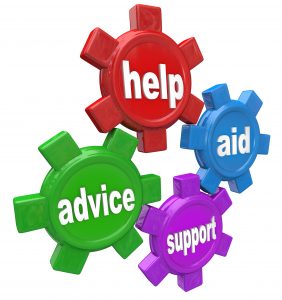 It is important for health and nutrition and quality of life that the person with dysphagia gets the help and support they need. The following guidelines may be helpful:
It is important for health and nutrition and quality of life that the person with dysphagia gets the help and support they need. The following guidelines may be helpful:
- Get to know and understand the person, and the extent of their dysphagia.
- Take time to get to know the dysphagia treatment plan extremely well and ensure it is followed consistently.
- Try to make mealtimes as pleasant an experience as possible.
- Be reassuring and calm.
- Reduce stress and distractions.
- Try and ensure food is hot enough.
- Be positive about food served. Never make negative comments about the diet and food /drink served in front of the person with dysphagia.
- Try to encourage the person to do as much for themselves as is safely possible, this will help make swallowing safer.

- Try to support the person to sit in a stable position. The feet should be supported and ideally there should be a 90 degree angle at the knees and hips. The person’s head should be in a slightly forward position.
- If person is ‘being fed’ sit opposite them or just off to one side, make sure they can see the food and see an approaching spoon. If they are visually impaired, give them verbal information about what the food is, when to expect the next mouthful etc.
- Give sufficient time for person to eat and drink. They may need longer to eat/drink safely.
- Monitor the environment for access to inappropriate and potentially dangerous food/drink when caring for people with cognitive impairment.
- Encourage a ‘little and often’ approach to eating and drinking for those people who struggle to safely eat a large meal in one sitting or cannot manage a large drink.
- It may be helpful to serve once course at a time to reduce confusion, rather than putting out a starter, main course and dessert all at once.
- If person becomes agitated, stop giving food/liquid until calm.
- If sleepy or has reduced alertness, stop giving food/liquid.
- If the person is repeatedly coughing, stop giving food/liquidAssist to maintain good oral hygiene, this is important for quality of life, comfort, social appearance and health.
- Make sure dentures are worn and fitted correctly, refer to dentist if necessary
- Try to ensure the person with dysphagia does not lie down directly after taking food and drink. This may present a risk of choking and aspiration if they have swallowing problems and consequentially retain some food/fluid in their throat or mouth even after appearing to swallow adequately. This may also be helpful to reduce the risk of gastric reflux.
- If at all concerned, refer to Speech and Language Therapy for dysphagia assessment.
 To successfully support the person with dysphagia it is important that those assisting have access to appropriate education and training, including information on management strategies, modified diets, risks and management of emergency situations. This information should be accessible to families and carers.
To successfully support the person with dysphagia it is important that those assisting have access to appropriate education and training, including information on management strategies, modified diets, risks and management of emergency situations. This information should be accessible to families and carers.
In health and care settings, appropriate training courses may be accessed.